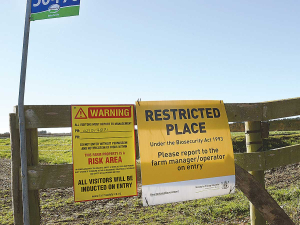Editorial: Happy days
OPINION: The year has started positively for New Zealand dairy farmers and things are likely to get better.
 A provincial declaration that New Zealand is free from Mycoplasma bovis could be made in October or November.
A provincial declaration that New Zealand is free from Mycoplasma bovis could be made in October or November.
A major milestone on New Zealand's unique journey to eradicate Mycoplasma bovis could come before the end of this year.
A provincial declaration that the country is free of Mycoplasma bovis may be made in either October or November, says Ministry for Primary Industries (MPI) director-general Ray Smith.
Speaking at the Primary Industries NZ Summit in Christchurch last week, he says the eradication of M. bovis has been "a real success story".
"So, if you were involved in that in any way, you have our deepest understanding of how difficult it is to have someone turn up on your farm one day and say, 'actually putting a notice on it, you're going to stop what you're doing until we clean this up'," says Smith.
"About 300 farmers had that experience. But we haven't had this disease turn up for two years now."
Smith says NZ has achieved something the rest of the world said couldn't be done.
"We spent $750 million getting to this point, industry and government both contributing to solving that problem. We're almost there.
"We'll see, if we get through this spring, which is the risky period, by October, November, we'll declare provisional freedom of absence of Mycoplasma bolus in New Zealand. And that's a great thing. To not have to live with lameness, aborted calves and mastitis related problems in our animals is a good thing to have achieved."
The M. bovis programme, jointly funded by the Government and farmers, started in 2018 and should finish by 2018.
Under the programme, we need to pass through three phases to provide confidence that M. bovis is absent in cattle herd - delimiting phase to identify and remove cases of infection and provisional absence - focussing on monitoring the cattle population through background surveillance. There needs to be two consecutive clear springs and two consecutive clear autumn calving periods to build up a good level of confidence that M. bovis is no longer present.
The third phase is confidence of absence. In this phase, background surveillance continues until the industry achieves a very high level of confidence that M. bovis is eradicated. This phase is expected to run for two years. The confidence of absence phase ends with a statement of absence and M. bovis is then considered exotic.
The Meat Industry Association (MIA) is once again looking for game-changing ideas for New Zealand's red meat processing and exporting sector.
Environment Southland is inviting feedback on two bylaws that play a critical role in safeguarding the region's waterways and ensuring the safety of the local community.
While the North Island is inundated with rain, Southland is facing receding water levels as warm weather and lack of rainfall continues.
Entries have opened for the 2026 Fieldays Innovation Awards.
Organisers are expecting another full field of 40 of the country’s top shearers for the popular Speed Shearing event at this year’s Southern Field Days at Waimumu.
The Southern Field Days Innovation Awards have a great record in picking winners and the winner of the 2024 event will be putting up a display to support the event at this year’s show.